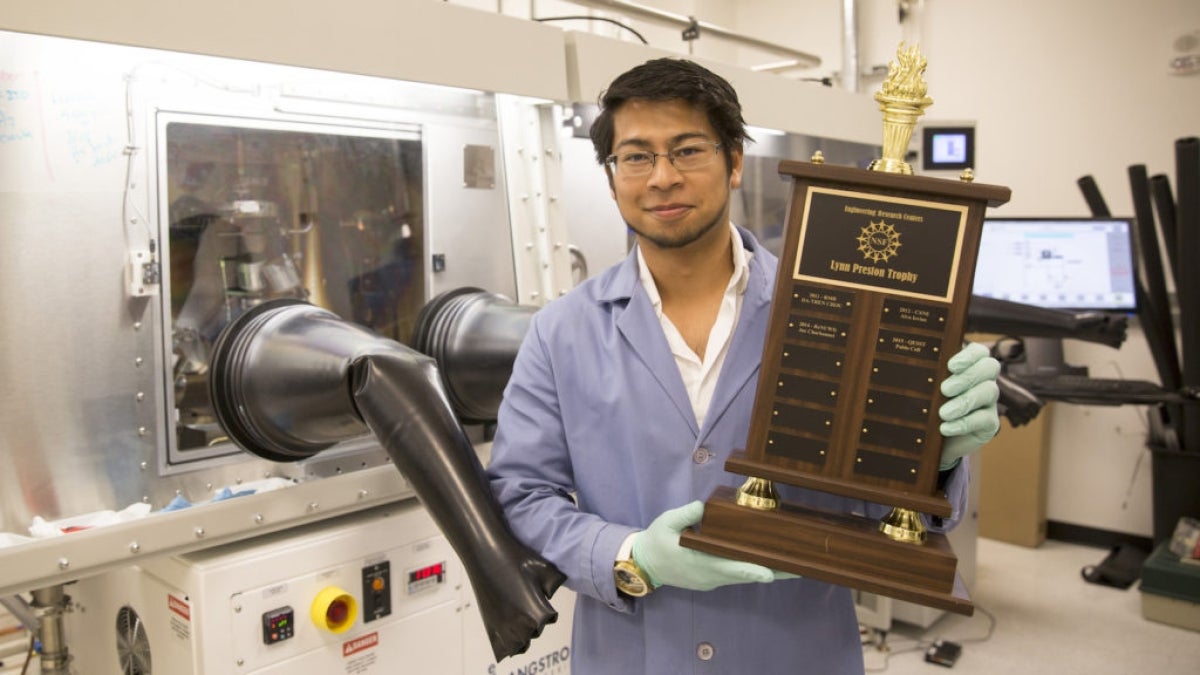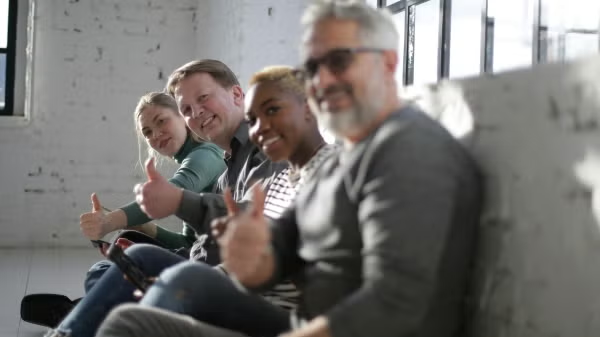QESST student wins NSF's Perfect Pitch competition

Sebastian Husein became the second consecutive student from Mariana Bertoni's group to bring home the Lynn Preston Trophy after winning the NSF's Perfect Pitch competition. Photo by Jessica Hochreiter/ASU
Sebastian Husein, a scholar in the Quantum Energy and Sustainable Solar Technologies National Science Foundation-Department of Energy Engineering Research Center, won the NSF’s Perfect Pitch competition at its biennial meeting. This marks the second straight time that a QESST student from Assistant Professor Mariana Bertoni’s group has won the $5,000 prize and brought back the Lynn Preston trophy.
Husein, a materials science and engineering doctoral student in the Ira A. Fulton Schools of Engineering at Arizona State University, had only 90 seconds to pitch his idea of deploying PV modules to places with interrupted infrastructure, but that was enough time to win over the panel of judges.
“The idea really sprung out of the hurricanes that hit Houston, Florida and Puerto Rico,” Husein said. “It’s a massive humanitarian crisis, especially in Puerto Rico, and the largest needs became obvious very quickly: power and drinkable water. I wanted to highlight an idea that could address both these issues, and the versatility of solar energy is well suited for that.”
Husein titled his idea “Solar Optimized Kit for Emergency Deployment." This deployable floating platform with bifacial solar cells produces energy, even under cloudy conditions, and acts as emergency aid for areas affected by floods and hurricanes. The energy created runs a water purification system, essential for disaster aftermath.
Bertoni, his mentor and professor, and with the DEfECT Lab worked with Husein to develop his idea and perfect his presentation.
“Her enthusiastic support and encouragement is what allows Pablo [Coll] and I to take part in and achieve a lot in competitions like Perfect Pitch,” Husein said. Pablo Guimerá Coll won the competition in 2015 with his project, “Sound Assisted Low Temperature Wafering for Silicon Modules.”
Bertoni, an electrical engineering assistant professor, believes the communication skills used in pitching ideas, a key factor in this competition, are important for engineers.
“Being able to convey complicated ideas in a simple way is a skill that I think every engineer should have,” Bertoni said. “I strongly encourage my students to develop their communication skills and find the right balance of what to say and how to say it based on their audience.”
This win was a step forward for Husein, who is optimistic for the future of renewable energy.
“I’m incredibly excited to see what our society does with renewable energy,” Husein said. “Some say our dependency on fossil fuels will remain for decades and decades, but we’ve already had massive amounts of solar integration.”
More Science and technology
Statewide initiative to speed transfer of ASU lab research to marketplace
A new initiative will help speed the time it takes for groundbreaking biomedical research at Arizona’s three public universities…

ASU research seeks solutions to challenges faced by middle-aged adults
Adults in midlife comprise a large percentage of the country’s population — 24 percent of Arizonans are between 45 and 65 years…

ASU research helps prevent substance abuse, mental health problems and more
Smoking rates among teenagers today are much lower than they were a generation ago, decreasing from 36% in the late 1990s to…